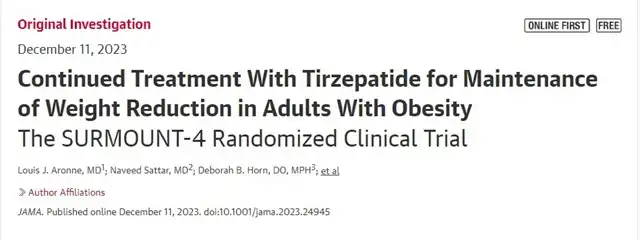Patients experience slow weight rebound after stopping Zepbound
- Normal Liver Cells Found to Promote Cancer Metastasis to the Liver
- Nearly 80% Complete Remission: Breakthrough in ADC Anti-Tumor Treatment
- Vaccination Against Common Diseases May Prevent Dementia!
- New Alzheimer’s Disease (AD) Diagnosis and Staging Criteria
- Breakthrough in Alzheimer’s Disease: New Nasal Spray Halts Cognitive Decline by Targeting Toxic Protein
- Can the Tap Water at the Paris Olympics be Drunk Directly?
Patients experience slow weight rebound after stopping Zepbound: Long-term use necessary?
- Should China be held legally responsible for the US’s $18 trillion COVID losses?
- CT Radiation Exposure Linked to Blood Cancer in Children and Adolescents
- FDA has mandated a top-level black box warning for all marketed CAR-T therapies
- Can people with high blood pressure eat peanuts?
- What is the difference between dopamine and dobutamine?
- How long can the patient live after heart stent surgery?
Patients experience slow weight rebound after stopping Zepbound: Long-term use necessary?
Eli Lilly’s weight loss drug, Zepbound, which was just launched in the United States last week to assist obese and overweight adults in losing weight and controlling it, may require continuous use in the foreseeable future, possibly even for a lifetime, according to a recent study. This revelation led to a roughly 5% drop in Eli Lilly’s stock price on Monday.
Published on Dec 11 in the Journal of the American Medical Association, the study revealed that after taking Zepbound for approximately eight months and then discontinuing the medication, participants experienced a gradual rebound in weight, with half of the lost weight returning within a year.

Specifically, after about eight months of Zepbound use, 670 patients had lost 20.9% of their body weight. Subsequently, half of the participants continued taking Zepbound for a year, while the other half took a placebo. Participants in the study also received lifestyle counseling to ensure reduced calorie intake and regular exercise.
Those who continued taking Zepbound for another year experienced an additional average weight loss of 5.5%. However, patients who took the placebo saw an average weight gain of 14%.
Louis Aronne, obesity expert at Weill Cornell Medical College and the lead author of the study, commented, “Early studies indicated that people who stop taking Eli Lilly’s weight loss drugs are prone to weight rebound. Nevertheless, most benefits of taking Zepbound are retained a year later.”
It’s worth noting that Eli Lilly funded the study, and Aronne serves as an advisor to both Eli Lilly and Novo Nordisk, two major players in the weight loss drug industry. Aronne stated in an interview, “The results are so good; I’m surprised. This study clearly demonstrates that for optimal results, continuous use of these drugs is necessary.”
Aronne added that those who took the placebo tended to have higher cholesterol, blood sugar, and blood pressure than those taking Zepbound. Additionally, the placebo group did not regain all the lost weight, and it’s unclear whether this is due to the lingering effects of the weight loss drug or the impact of lifestyle counseling.
Need for Long-Term Use?
Jeff Emmick, Senior Vice President responsible for product development at Eli Lilly, emphasized that patients, healthcare providers, and the public do not always understand that obesity is a chronic disease that typically requires ongoing treatment.
Dr. Michelle Hauser, Director of Obesity Medicine at the Stanford University Lifestyle and Weight Management Center, remarked, “We wouldn’t prescribe an antihypertensive medication and then say, ‘Great, your blood pressure is much better, you should stop the medication.’ For some reason, there’s a magical thinking around obesity, like you take this pill, it causes weight loss, and the weight loss will persist after stopping the medication.”
However, Dr. Melanie Jay, Director of the Langone Obesity Comprehensive Program at New York University, believes that weight gain is often a reality for many patients who want to discontinue medication. “No one wants to take medication forever; some patients don’t want to inject themselves indefinitely. In addition, the monthly cost of $1,000 is also prohibitive for many.”
Drugs like Zepbound are considered medications that may require long-term use, but there is currently no reliable data on what might happen if people take these drugs for several decades. Ozempic, Wegovy, Mounjaro, and Zepbound all belong to the same class of drugs and have been on the market for less than 20 years.
Currently, doctors say they are trying to balance the side effects and potential risks of these drugs with the health problems associated with untreated obesity. However, they believe that the only way to maintain the effectiveness of weight loss drugs may be to adhere to continuous use.
Jay stated, “If patients want to stop the medication, we’ll try. But we also tell them what the outcome is likely to be, and so far, it seems that most people’s weight rebounds. But this is not the patient’s fault; it’s because obesity is a disease, and medication helps address this problem.”
Patients experience slow weight rebound after stopping Zepbound: Long-term use necessary?
(source:internet, reference only)
Disclaimer of medicaltrend.org
Important Note: The information provided is for informational purposes only and should not be considered as medical advice.



